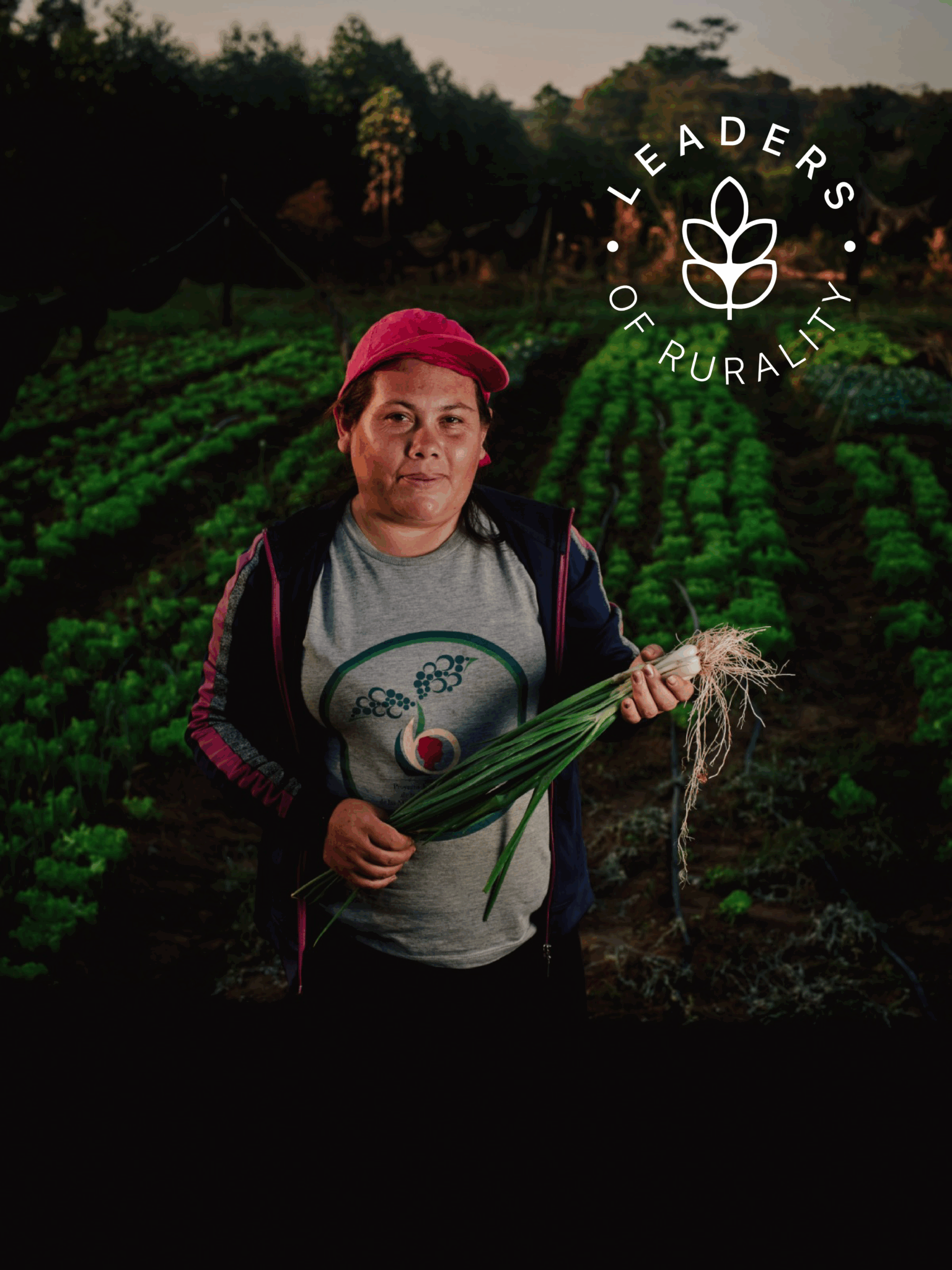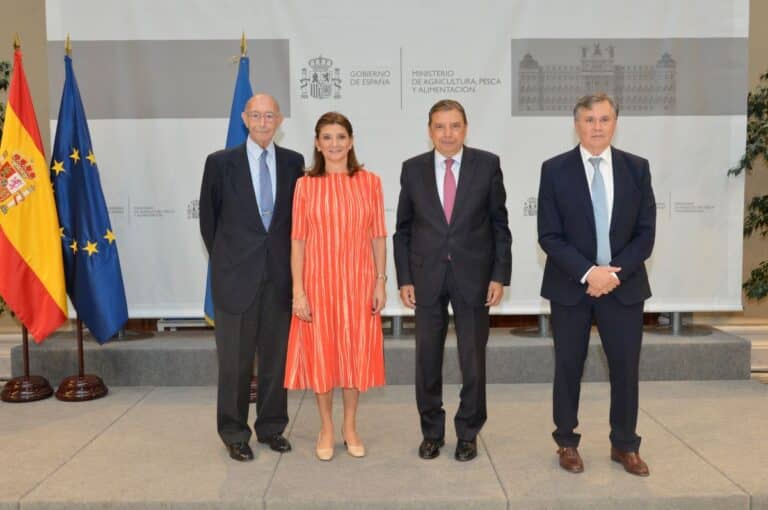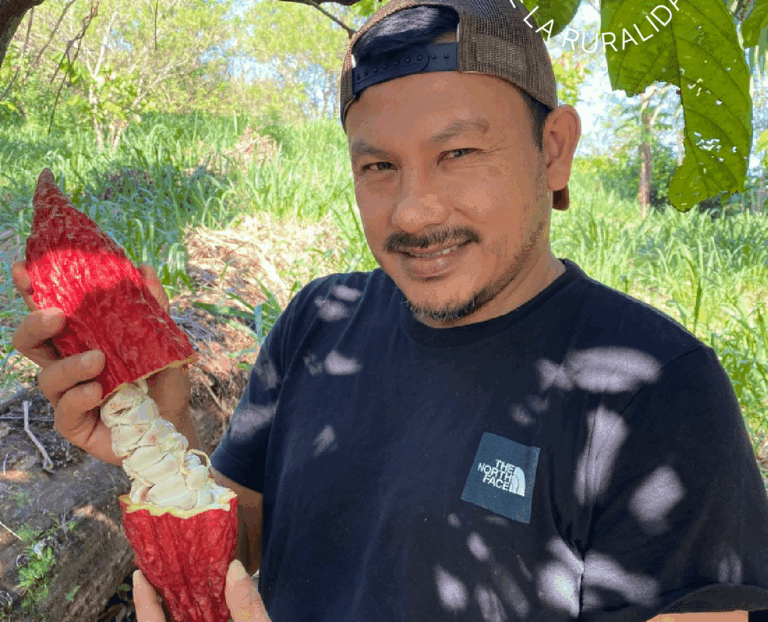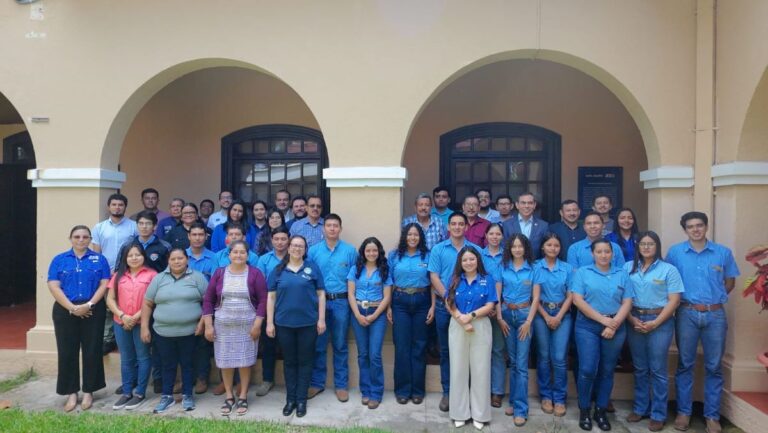
Asunción, 17 September 2025 (IICA). In introducing herself, this rural farmer appears to summarize everything that motivates her in just a few words. “My name is Nidia González”, she says, as the interview begins. I’m from Coronel Oviedo in the Department of Caaguazú, Paraguay. I am President of a women’s group, which has now become an association that includes male members, so the whole family is united”.
It is no small feat to head this group, which aims to improve the income and standard of living of the entire community. Nidia must still do her household chores and farming, while also rising very early on several days per week, to travel with her neighbors to the city to sell tomatoes, cassava, eggs and chicken in the market.
Yet, she tells us that no burden is too great because her goal is clear: “to make it in life and succeed”.
The Inter-American Institute for Cooperation on Agriculture (IICA) has named González as one of its Leaders of Rurality of the Americas, in recognition of her work to assist small farmer communities in Paraguay, particularly women, showing them opportunities to create a better life in the countryside. Nidia will receive the “Soul of Rurality” award, a distinction created by the multilateral organization to showcase individuals who are leaving their mark and making a difference in agriculture-related fields in the hemisphere.
González explains that she was born in the countryside, “in the very heart” of Paraguay, living at first with her parents. Later, on getting married she moved with her husband to their own one-hectare property, where they established their small farm. That also marked the start of their family, which now includes three children (Leandro, the youngest; Romina Jazmín, who is fifteen; and José Camilo, who is eighteen). Her husband, Domingo, “also works with us here. We are a very close family”, she says proudly.
However, in the early days, life was not rosy, financially. “We had no fixed income, no weekly or monthly salary”, recalls Nidia, “and earnings came from “the harvest that we reaped every four months”. Yet, destiny opened a window of opportunity for her when she learned about a program aimed at improving the standard of living of rural women—”Mejoramiento de Calidad de Vida de las Mujeres Rurales del Paraguay”—which was launched in 2019 with the support of Yokohama University. When it ended, a group of participants were invited to visit Japan for a one-month training mission.
Nidia was among that group and after completing the program in the Asian country, “I returned with another mindset”.
“I admired so many things that I saw in Japan”, recalls González, who was particularly impressed that despite living in an archipelago of only 377,000 square kilometers, the Japanese “are able to grow practically everything in a bucket, you could say”. The small farmers that I met “even grew cassava”. They also “produce and consume their own scallion”, said the Paraguay leader with surprise.
She was also amazed by Japanese women’s level of participation in rural activities and decision-making.
“Up to now, I have not had the chance to apply everything I learned, but I think that the excellent group that I am working with has achieved a lot, little by little”. That group is the Comité de Santo Domingo, which now includes sixteen women farmers from her community. One of its major activities is organizing farmers’ markets in Coronel Oviedo, a city of 100,000 inhabitants located only thirty-five kilometers from her farm.
According to Nidia, the markets provide an excellent opportunity for the farmers to earn a stable income. Explaining to us how the initiative first started, she recalls that, “We realized that we were producing enough lettuce, scallion, and other products for our own consumption and still had surplus”. At first, the project was supported by the university, which gave them space to sell once per week. Then they added two other days and other venues.
Even from those early ventures, “we would come back with a profit, bringing something home. We felt great, we felt useful”, says González. We realized that this was something we could do as women to contribute to the household”, which was no doubt a critical contribution, “because sometimes our financial situation was very difficult”.

Nidia and her organization are setting their sights on the region becoming an agrotourism attraction. They have already chosen sections of the landscape, clearing them and planting fruit trees.
Everything that can be transported from the farm
On market days, instead of setting her alarm for five in the morning, as she does on regular workdays, Nidia sets it for two, because she must prepare and make the trek to the city. She sells chard, parsley, pork, chicken, cheese and eggs in her stall, “everything I can carry from the farm”. She informs us that her tomatoes have received organic certification from SENAVE, the National Plant and Seed Quality and Health Service of Paraguay. In her view, the certification gives her an advantage and is a source of pride. Technical officers from the organization regularly collect samples of the fruit, taking them to Asunción to be examined. If there are any traces of chemicals detected, the products will lose the certification.
University students who have known her since the days of the earliest markets and other regular customers await her in Coronel Oviedo. In fact, she keeps in contact with them, informing them beforehand about where and what types of products she will be selling the following day. She even takes orders. However, the market, is not simply a trade outlet. She must produce, provide top quality produce and continue to move the community forward.
González explains that, “When I go to the market, I take my products, but also the products of the community”, which have been grown by people in the region. “Sometimes four or five ladies bring me different products. They suggest a price. I carry and sell the goods and bring back some money for them”.
Nidia’s notes that all of them have something in common. “We want to move forward, to progress and to make sure that our children want for nothing”. The Paraguayan farmer admits that at times, “people ask me if I don’t get tired or ask how I remain so optimistic. But I think that women can succeed, just like men. We simply must figure out how and we must persist. Of course, at times we need help, because no one can do it alone”.

Nidia must still do her household chores and farming, while also rising very early on several days per week, to travel with her neighbors to the city to sell tomatoes, cassava, eggs and chicken in the market.
The dream of agrotourism
In addition to the markets, Nidia and her organization are setting their sights on the region becoming an agrotourism attraction. They have already chosen sections of the landscape, clearing them and planting fruit trees. “There is a beautiful forest” that the future tourists could enjoy”, she tells us enthusiastically. “We already have our kitchen gardens that we cultivate and maintain on a daily basis”, and where we could teach visitors how to grow vegetables and sell them carrots or tomatoes that taste natural”.
Developing agrotourism in the region is one of the main goals of González (in the past she participated one of IICA’s demonstration plot programs) and her neighbors. I want to introduce visitors to the joys of daily life in rural areas – the mornings, “waking up to birds singing”, as they are drawn by the sweet scent of mangoes and papaya, as well as the sounds of the roosters and other animals. Nidia assures us that it is a “powerful experience that energizes you, inspires you, gives you reason to say ‘hey, here I am, happy to be alive’”.
She also dreams of building a cabin for visitors to stay and a tatacuá, a traditional Paraguayan outdoor oven made of brick and mud, where she can prepare delicious local dishes “that my mother and grandmother taught me” for the visitors.
“I have big dreams”, says Nidia quite timidly, in a voice that somewhat contradicts the sheer magnitude of her dreams. “I want agrotourism to work. I want to build a chicken coop right beside my house, and a greenhouse”, to protect our crops from being ruined by the frost.
González explains that: “We lose a lot of production due to the frost, because we don’t “have the proper infrastructure”, the equipment she would like to have. “You must figure out how to work with nature. None of us can say, ‘well this year, I don’t want any frost, so there won’t be any’. Nature decides”.
The farmers must also have the knowledge and capacity to tackle the summers, with temperatures as high as 40 degrees that scorch the vegetables. “My dream is for the farmers who I am working with and myself to be given the same opportunities, the same infrastructure” that will help us to manage the heat waves and the frosty weather better”.

Nidia works to assist small farmer communities in Paraguay, particularly women, showing them opportunities to create a better life in the countryside.
More information:
Institutional Communication Division.
comunicacion.institucional@iica.int











